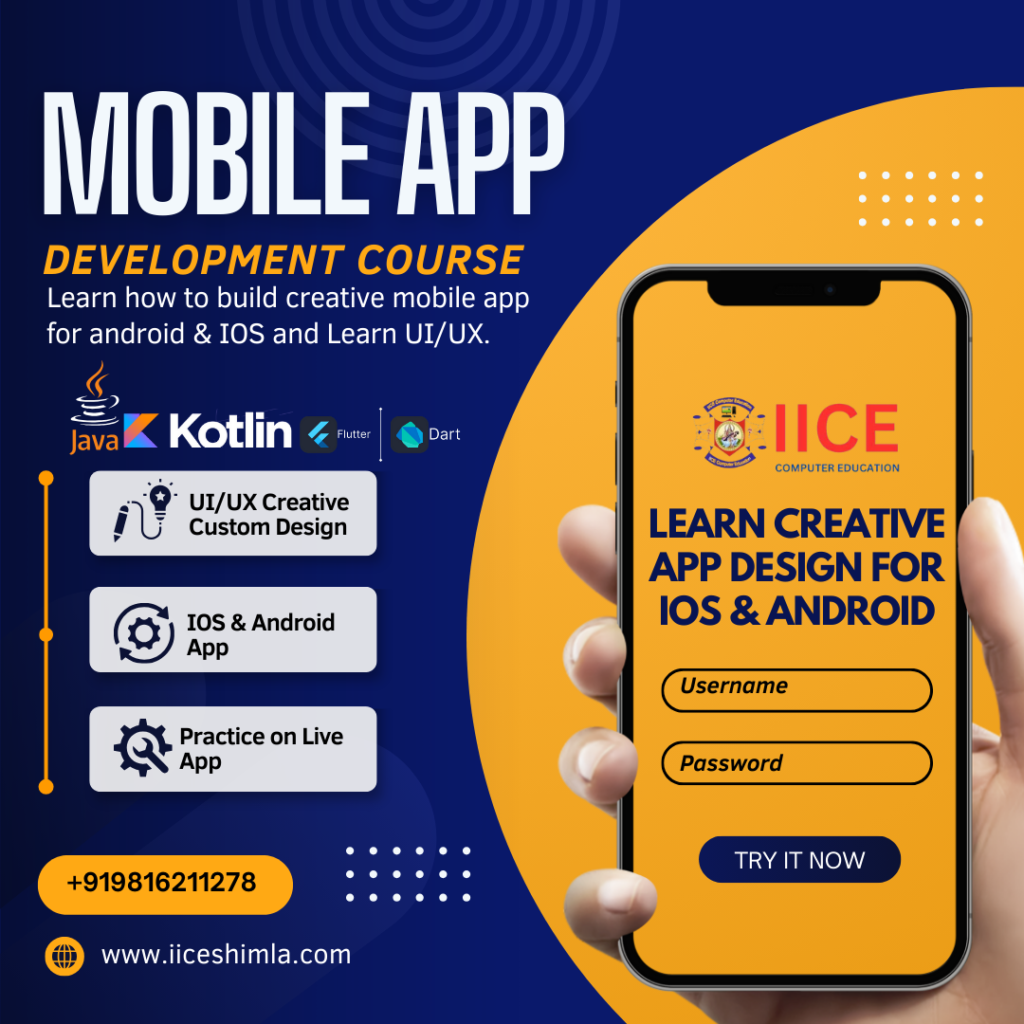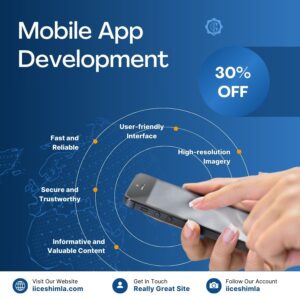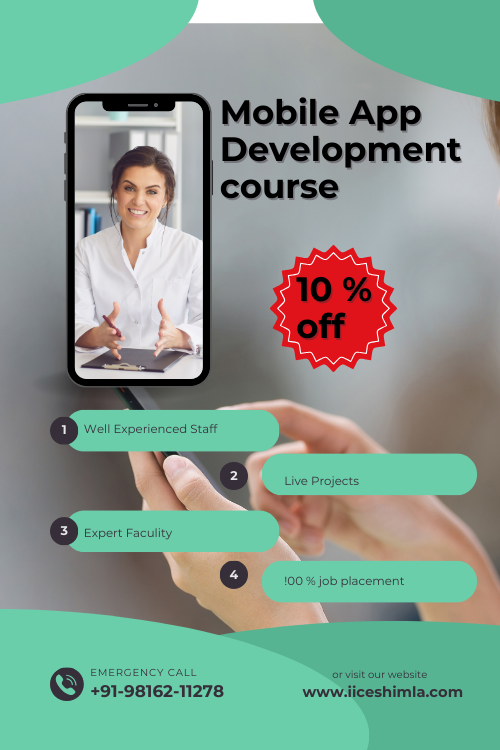
Mobile app development course
The Mobile App Development course at IICE Shimla incorporates extensive practice on app design and development for Android as well as the iOS platforms. This course covers all the latest programming languages, frameworks, and tools such as Java, Kotlin, Swift, and React Native on real-world implementations and exercises.
Principles of app design and real-world UX optimization are incorporated to ensure that students can hit the industry floor ready after graduation. With expert teachers and a curriculum that focuses more on practical understanding, this program will equip graduates with the technical skills to engineer innovative, intuitive mobile applications into today’s hyper-tech world.

Jobs Scopes of Mobile App Development course
A Mobile App Development course opens great career opportunities in the tech sector. The candidate can become an Android/iOS Mobile App Developer designing apps in the languages of Java, Kotlin, or Swift and can further specialize as Cross-Platform Developers through frameworks like React Native or Flutter.
Other roles that include are: UI/UX Designers; QA Testers who ensure app quality; Project managers for overseeing app development; Mobile app consultants; game developers; Backend developers; app entrepreneurs; many more opportunities open as the mobile app is one that is widely sought.

Mobile App Development course syllabus
Introduction to Mobile App Development
- Overview of Mobile App Development
- Types of Mobile Apps: Native, Hybrid, and Web Apps
- Mobile Development Platforms: Android, iOS, and Cross-Platform (React Native, Flutter)
- Introduction to Development Tools (Android Studio, Xcode, VS Code)
- Understanding Mobile App Life Cycle
Programming Fundamentals for Mobile Development
- Introduction to Programming Languages: Java (Android) and Swift (iOS)
- Object-Oriented Programming Concepts
- Variables, Data Types, and Functions
- Control Flow: If-Else, Loops, Switch Statements
- Understanding Classes, Objects, and Methods
Android App Development Basics
- Introduction to Android Studio and Project Setup
- Understanding Android Components: Activities, Services, Broadcast Receivers, and Content Providers
- Creating User Interface (UI) with XML
- Handling User Input: Buttons, Text Fields, Checkboxes, and Radio Buttons
- Working with Intents and Intent Filters
Cross-Platform App Development
- Introduction to Cross-Platform Development (React Native, Flutter)
- Setting up Flutter or React Native Development Environment
- Designing UIs Using Widgets in Flutter / Components in React Native
- Working with Navigation and Routes
- State Management in Cross-Platform Apps
- Handling API Requests in Cross-Platform Apps
Mobile App UI/UX Design Principles
- Understanding Mobile App Design Guidelines: Material Design (Android) and Human Interface Guidelines (iOS)
- UI Design Principles for Mobile Apps: Layouts, Navigation, and Responsiveness
- Implementing Animations and Transitions in Mobile Apps
- User-Centered Design and Testing
- Creating Mockups and Prototypes Using Tools (Adobe XD, Figma.
Mobile App Data Management
- Introduction to Databases for Mobile Apps (SQLite, Firebase)
- Integrating Firebase for Real-Time Data Syncing
- Working with RESTful APIs for Data Exchange
- Storing and Retrieving Data from Cloud Services
- Managing Offline Data and Syncing with Cloud
- Implementing Security in Mobile Apps: Data Encryption and Authentication
About Mobile App Development Course
Mobile app development: Revolutionizing our way of connecting, workA Mobile App Development course opens great career opportunities in the tech sector. The candidate can become an Android/iOS Mobile App Developer designing apps in the languages of Java, Kotlin, or Swift and can further specialize as Cross-Platform Developers through frameworks like React Native or Flutter. Other roles that include are: UI/UX Designers; QA Testers who ensure app quality; Project managers for overseeing app development;
Mobile app consultants; game developers; Backend developers; app entrepreneurs; many more opportunities open as the mobile app is one that is widely sought,livingdigital age of today, mobile apps are an integral part to our everyday lives. They revolutionize how we communicate wineother, shop, do business, and even entertain ourselves. The demand for mobile application development is increasing, leading businesses to invest to enhance the customer experience, increase revenue and engage users. Mobile apps, be it for personal use or business, have changed how the world interacts and uses technology.
App development is the process by which software applications are created to run on mobile platforms like smartphones and tabs. These apps work on different platforms such as iOS, Android (Google), cross-platform and other operating systems.
is the leading ituthe field of mobile app creation. They offer specialized courses to help students develop the skills they need to create functional and innovative applications.
Why Mobile App Development for Business is Critical?
Due to the increasing popularity of smartphones, mobile devices and apps, companies are increasingly lookgt mobile applications as an integral part of their business. Mobile app design is vital for driving brand loyalty and customer engagement. It can also provide a seamless, cross-platform experience. Mobile app development is critical for a number of reasons.
Business Expanding. A mobile app can help businesses reach a broader audience, expand their client base, and enhance serv ort offerings. Apps provide businesses with the opportunity to enhance customer experience, and offer value that cannot be achieved by websites or physical storefronts.
Customer convenience: Mobile app userc access services, information and products with ease, from the comfort of any mobile device, at anytime and anywhere. This convenience increases user engagement and builds customer loyalty.
Increased Income : Mobile apps are monetized via a variety of methods, including advertising, subscriptions and features that come with premium versions. This opens new revenue sourcf.
Direct communication With the help of mobile apps, companies can inform their users about updates, new products or services. This instantaneous communication helps businesses remain connected with their audience.
Advantage : A well designed mobile app can provide a business with a competitivehrough providing an exceptional experience for customers, increasing operational efficiency and offering unique service that stands out from the competition.
Mobile App Development Pc
Mobile app design is a multistep procedure that requires planning, design development, testing and deployment. Here’s an outline of the typical mobile application development process.
- Planning Ideation
The planning phase is the first step of app development. This phase involves understanding app objectives, its target audience, as well as its purpose. Developers work with clients to determine the app’s design, features, and functionalities. This stage involves conducting market research to identify the needs of users, potential competitors, and industry trends.
- design
The design phase focuses primarily on creating an intuitive interface and a compelling user experience. Designers design wireframes prototypes mockups that show the layout of an app, its navigation, and its visual appeal. It is important that the user can navigate through an app easily and use its features.
- Developer
The actual coding is done in the development stage. Developers will use different tools and programming languages depending on which platform they are developing for (iOS, Android). The app’s backend is built (server-side), as are its frontend. Backend developers work with databases, server code, and APIs. Frontend developers create the app’s interface.
iOS Development: iOS programs are typically created using Swift (or Objective C) programming languages.
Android app Development: Android programs are developed using Java, Kotlin, or HTML3_ Swift HTML3_.
Cross Platform app development is used to develop cross platform apps that are compatible with both iOS and Android.
- Testing
After an app is created, it undergoes extensive tests to identify and correct bugs, glitches and issues with performance. Testing is used to make sure that the app provides users with a seamless and smooth experience. Different types of tests are performed, including usability and performance tes well as security testing.
- Deployment
After a successful launch, the app will be available for download. Developers submit app to app stores. Once the app is approved, users can download and install it. App approval may require developers to adhere to specific app store guidelines.
- Maintenance
Updates and regular maintenance are necessary to maintain compatibility, fix bugs, optimize performance, add new functions, and ensure that mobile apps work with new operating systems. It is important to maintain your app in order to ensure that it remains relevant and useful.
Mobile App Development at IICE
The , IICE Mobile App Development course provides a comprehensive introduction to developing mobile apps for iOS or Android. This course is for those with no prior programming skills as well as beginners. IICE’s structured learning path takes students through every aspect of mobile app development from the first planning phase to the last deployment.
IICE Mobile App development Course: Key Features
Curriculum relevant to Industry IICE’s mobile app course covers all essential topics. The following are the topics that students learn:
Basic programming concepts and logic
Mobile app frameworks (iOS, Android)
UI/UX design principles
Database Integration and API Usage
Usd-party software and services
Test, test, and deploy mobile apps
Hands – on Training Students learn by doing real projects and building their own mobile app. This hands-on approach allows students to develop their confidence and competency in app creation.
Expert Faculty Experienced instructors teach the course. They have a good understanding of app development for mobile devices and current industry standards. These experts are available to provide guidance, advice, and mentoring throughout the entire course.
The Learning Environment iICE offers online and classro arnoptions. This allows students to select the best option for theiredule. Learning environment that fosters creativity. Students can build strong foundations on mobile app development.
Job Placing Assistance IICE assists students in finding a job after they complete their course. The institute, with its strong network of industry contacts, helps students get internships or job placements within leading tech companies and app development agencies.
The Benefits of Learning Mobile App Development
High Demand App Developers. Mobile app development has become one of the most rapidly growing fields in the technology industry. If you learn mobile app-development, your chances for landing a good job in tech are increased.
Entrepreneurship Options Students who have completed the course can use the skills to build and possibly monetize their own mobile apps. App sales, in app purchases, and advertisements are just some of the many ways entrepreneurs can make money in the app market.
Career Growth : Mobile App development is a growing field. It’s constantly evolving with new technologies, tools and techniques. This creates many opportunities for career development and advancement.
Innovating and Creativity. Mobile app development is a great way to maky creative ideas a reality. You can create apps that solve real world problems, entertain the user, or improve your business processes.
Conclusion
The mobile application developnindustry is booming. As mobile phones and tablet devices become more popular, the need for skilled app designers continues to grow. By enrolling in IICE ’sMobile App Development course, you will take a major step in your career. IICE’s comprehensive curriculum, hands-on learning, and expert instructors will provide you with everything you need to succeed pp development.
Join the exciting new world of mobile technology by becoming a developer for mobile apps today using IICE.
